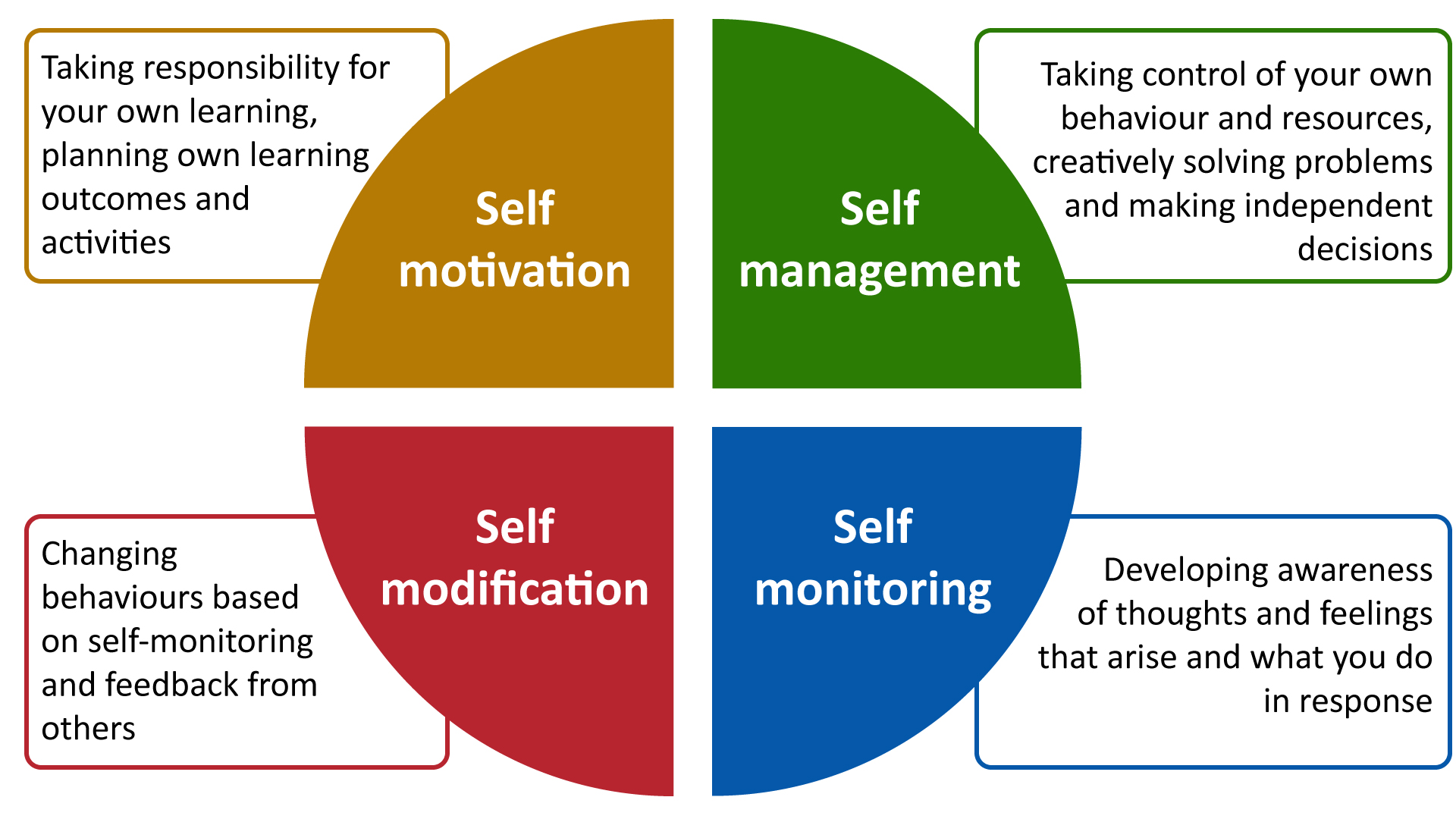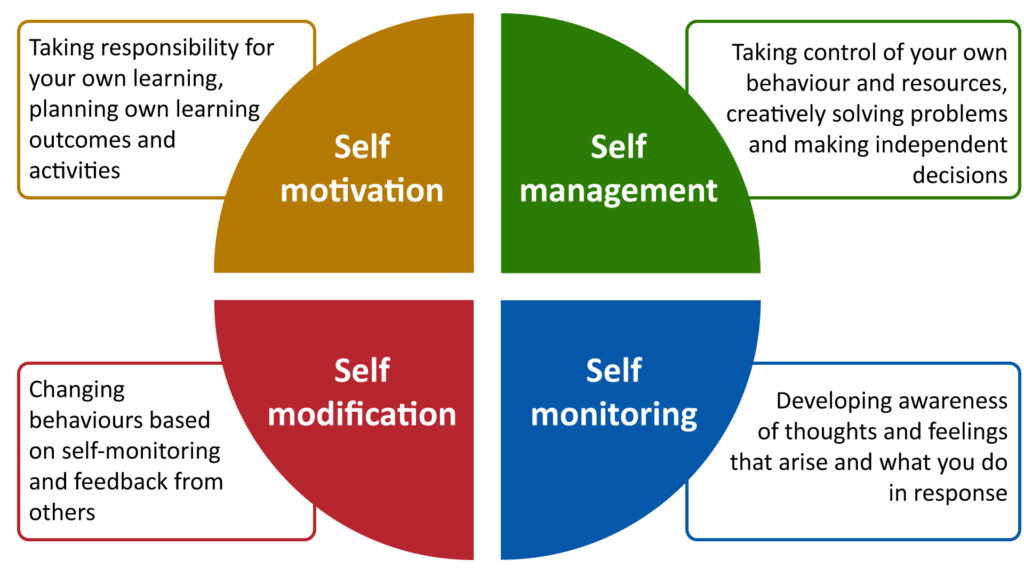The M-word. Motivation? Mindset!

Starting a new calendar year by thinking about how you learn is a good step.
Warning – this post contains a lot of questions!
I recently read an interesting article about being a self-directed distance learner. Studying this way clearly requires strong motivation and a readiness to learn. Many principles, however, are also sound prerequisites for learning at university in general.
The first – M
1. I am motivated: I have a desire or need to know or do something.
OK, you need to move on from school, college or current work and want to do something new. Firstly, clearly define ‘something’! Motivation does not come from other people telling you, your peers pressurising you into or family tradition dictating what you should do. Well known are the two main types of motivation: intrinsic and extrinsic. Evan Tarver explains it intelligently and concludes that a combination of the two is best with the ideal result of being happy and content. (Happiness? Discuss).
And while looking into the balance of the two types of motivation, as usual, I get stuck in some psychology of learning. Do you know the Premack principle? This principle is synonymous with the so-called ‘Grandma’s rule’:


‘if you eat your vegetables…
then you can have dessert.’
Something along the lines of ‘work hard, play hard’, I reckon. Think about what being motivated means to you.
2. I set goals and make plans for my learning; I know what I want to do and how I will schedule my time.
Back to the distance or distant learner. Goal setting and scheduling in general are tools that can/will keep you on track. When you start university, you will be using diaries, timetables and should get into your study rhythm pretty soon. There are, however, whole days with no timetabled classes as such which needs getting used to. Time to establish library visits, reading in general, group work, etc. Then there is the awkward second year, when you are meant to enjoy yourself as a student. But even then, planning should not go out of the window. If you set rules, establish habits early on, however small, you will benefit and soon notice what works best for you. (I use this video in my teaching on time management mini-habits. This other video is also interesting.)
OK, here we go again. This will touch on things like being organised, making plans or planning a project. It is proven, once you feel organised and on track, your motivation will kick in. Have a look here for timetable templates.
3. I find and manage academic resources, knowing where to look and who to ask when I have questions or concerns.
This part touches on information literacy (plus other literacies like ‘academic’). The information literacy landscape as used by librarians lists skills and abilities, intelligence, motivation, environment, personal attributes, IT skills, academic integrity, feelings, perceptions, mediations and more. Quite a list, isn’t? From who you speak to, what ethical angle you look at to how capable and critical you are when searching the internet, all of this is part of it. Distinguishing between fact and opinion? Developing an awareness of fake news pieces?
Awareness is good, training in required and constantly changing skills is even better:
- Did you know that you can get a certificate in digital skills while studying?
- Have you had an online chat with a librarian yet?
- Do you know your faculty librarian?
- Or else, how aware are you of the special collections in the library?
4. I measure my academic progress by reviewing my goals and making adjustments as needed.

Progress checks require reflection, knowing how to benefit from your tutors’ feedback, seeking and discussing feed forwards and building a sustainable support network amongst other things. Get into the habit of always asking yourself questions:
- Where am I?
- Where am I supposed to be?
- Have things changed and how?
- What do I learn from that step/ mark/ comment?
- Why am I here?
These will help you to make realistic adjustments throughout your studies.
Last but not least, keep focused on what comes next after your course finishes. Nowadays we do not know exactly the types of jobs that are waiting for us out there in 10+ years’ time. One gem in there is the factoid, trivial but interesting by nature, that only one job completely vanished in the last 60, that of the elevator operator. But read on. Good to know that “humanities students should not abandon their love for the arts, as key to a student’s future success and happiness is the pursuit of a career they enjoy”. In fact, five of the key skills for future employment involve the use of key human skills, such as mental elasticity and complex problem solving, critical thinking, creativity, people skills, and interdisciplinary knowledge.
The second – M
Arguably, motivation is the biggest driver. Whether you are motivated by money, recognition, the number of followers on social media, your subject, a desire to help others, to progress or invent something, it is motivation with a capital M. Probably a good mix of intrinsic and extrinsic. The other fascinating M, however, is your mindset. Do you have a fixed or growth mindset?

In their book, The Student Mindset (2019), Steve Oakes and Martin Griffin discuss how and why students can be successful at what they are doing. Apart from previous educational success, learning styles and such things like your tried and tested strategies and techniques, the authors developed VESPA. These are characteristics including vision, efforts, systems, practice and attitudes of students. It looks at things like comfort zones people need to break out of and offers ways of looking at one’s own attitudes. Interrogate yourself in a chain of related questions and be honest to yourself.
Try these questions from Oakes & Griffin (2019, p. 118-119):
- How do you respond to something that goes wrong?
- Are you attending lectures? If not, why? Be honest to yourself – why?
- Because you are staying in bed until 11am – Why?
- Because you don’t feel motivated to go in? – Why?
- Because you are not enjoying it – Why?
- Because it is too theoretical at the moment and does not link to your practical work – Why?
Take some actions immediately and you will feel better for having done something. Generally, people are willing to help, signpost you somewhere further or even suggest solutions. Sleep on it, then act on it.
Do not be happy with plateauing in your development. If you have to write an essay in your first year, you cannot use your A-level materials. Make sure you fully understand the brief and see the task in the context of the whole teaching unit. Perhaps try to push yourself beyond your comfort zone (write something every day, let someone else read your draft and comment, or try a different collection in the Library) and, finally, always seek feedback.
This all feeds into being self-directed and becoming independent. Here is a visual summary:

You will see that the terms ownership, extension of and monitoring your own learning nicely mirror the above questions on motivation and mindsets.
Lots can be found in the literature about how to work with peers, in groups and benefit from team efforts. However, everybody should give herself or himself individual learning space as well as carry out regular progress checks. Did you know that research convincingly shows that past success does not correlate with future successes?
So, if you get into the right mindset, motivation will follow. Make 2020 a purposeful year!







Leave a Comment (note: all comments are moderated)